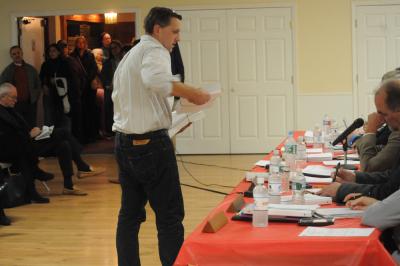Disputed Rental Registry Established in East Hampton

The East Hampton Town Board established a rental registry by unanimous vote at a work session on Tuesday morning.
The new law will require property owners to file with the town Building Department before advertising or entering into leases. Landlords who do so without registering, and tenants who occupy unregistered premises, will be subject to prosecution. Registration requires a $100 fee for a registry number, which will be good for two years.
The proposal had been vigorously debated for some time and was the subject of several town board sessions, as well as a hearing attended by 300 residents last month. It had engendered a vocal and organized contingent of opponents, a number of whom were on hand at Town Hall Tuesday
The information to be filed includes the number of legal bedrooms and number of legal occupants in a house, according to state law, but not the names of tenants. The law also requires information about rental periods that is to be updated when changes occur. A fee for filing updates, which had been proposed, has been dropped.
Property owners also would have to certify, by notarized statement, that their properties meet state maintenance codes regarding 22 items, such as smoke detectors, pool fencing, and stairway handrails.
Opponents, including several who urged the board on Tuesday morning not to move ahead with the registry, have said it would cause economic harm, that its imposition is overkill when only a small number of rental properties run afoul of existing laws, and that it would not solve overcrowding, share housing, or illegal short-term rentals.
Town Councilman Fred Overton, the sole Republican on the town board, who sponsored the resolution establishing the registry, said before the vote that though the hearing was "an outcry of opposition to some degree," he had met with constituents of varying opinions and was "comfortable offering this resolution." He said he was not convinced that the registry is unconstitutional, as had been alleged. And, he said, "I'm not convinced that it's going to create the problems that some people say it is.
Town officials and ordinance enforcement personnel have insisted that having property information on file will enable more efficient prosecution of housing law violations.
"I'm comfortable with the idea that this will help enforcement by addressing a number of important issues," Councilman Peter Van Scoyoc said at the session. "It's not a silver bullet, but I do believe it can be an additional, effective tool," Town Supervisor Larry Cantwell said.
Councilwoman Sylvia Overby agreed with those who have said that criticism of the law was based on a lot of "misinformation;" Councilwoman Kathee Burke-Gonzalez offered to meet with those who continue to question it.
The existing town prohibition against more than two short-term rentals of two weeks or less within a six-month period is unaffected by the new law. However, many speakers have suggested revising that restriction due to changes in the vacation market, with many now seeking short-term versus seasonal rentals. Those comments, Mr. Cantwell said, "have made me even more concerned that there's a great deal of high turnover weekly rentals going on in this town."
"We have to ask the larger question," Mr. Cantwell said. "Do we want to commercialize these residential areas. . .in order to foster growth and economic opportunity? What kind of community do we want to be?"
Seasonal rentals have long been a source of income for town residents, he acknowledged, "but I think there has to be some limit to the commercialization of our residential neighborhoods."
